Make a style statement with black frames
Smart and serious, black frames can create a striking look. Think Ryan Reynolds, Idris Elba, Courteney Cox, Oprah… the list of famous people who rock black glasses frames goes on.
And the great thing is they really do suit pretty much everyone, no matter your hair colour or skin tone.
Plus, black will work with most style choices, from fashion forward to vintage, while giving a professional, sophisticated vibe when teamed with office-wear.
So, whether you like a bold chunky frame or something slimmer and more lightweight, we have plenty to choose from at Patrick & Menzies! Read on to find out more about some of our favourite black frames currently in stock at our four North Essex branches.
Emporio Armani 3079
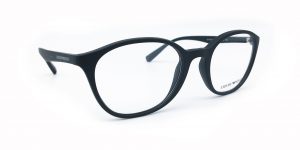 Quality and style go hand in hand when you invest in a pair of Emporio Armani glasses frames, and there are plenty of options to choose from. We love the soft curve of this design. Simple yet sophisticated these glasses give a nod towards ever-popular cat-eye shaping which always looks fantastic in black.
Quality and style go hand in hand when you invest in a pair of Emporio Armani glasses frames, and there are plenty of options to choose from. We love the soft curve of this design. Simple yet sophisticated these glasses give a nod towards ever-popular cat-eye shaping which always looks fantastic in black.
Find out more >
Lulu Guinness l915
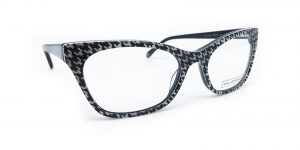 These glasses from Lulu Guinness are seriously stylish. Plain black from the front with a pop of pattern on the sides, they have plenty of personality as you would expect from this exciting eyewear brand.
These glasses from Lulu Guinness are seriously stylish. Plain black from the front with a pop of pattern on the sides, they have plenty of personality as you would expect from this exciting eyewear brand.
Polo-2115-5001
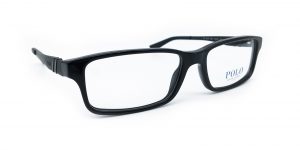 If you have a rounder face shape, then these rectangular frames from Polo would be a fantastic investment, proving that you don’t need to opt for a bold colour choice to find frames which will help accentuate your eyes. And if you aren’t sure what shape your face is, our recent blog can help.
If you have a rounder face shape, then these rectangular frames from Polo would be a fantastic investment, proving that you don’t need to opt for a bold colour choice to find frames which will help accentuate your eyes. And if you aren’t sure what shape your face is, our recent blog can help.
Find out more >
Rayban 7073-2077
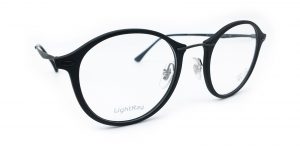 Looking for black frames that are a little more lightweight? Then this pair of specs from Ray-Ban are the answer! The exciting design in a mix of materials is striking for all the right reasons, as you would expect from this world-class brand.
Looking for black frames that are a little more lightweight? Then this pair of specs from Ray-Ban are the answer! The exciting design in a mix of materials is striking for all the right reasons, as you would expect from this world-class brand.
Anton Phillips 1023-matt-black
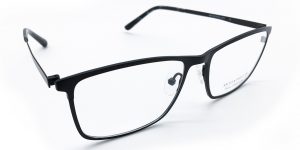 When it comes to black frames it doesn’t always have to mean acetate. These metal frames from Anton Philips are a great choice if you love the simplicity of black but you don’t want an overly bold look.
When it comes to black frames it doesn’t always have to mean acetate. These metal frames from Anton Philips are a great choice if you love the simplicity of black but you don’t want an overly bold look.
Did you know you can browse the current selection of black glasses frames available at Patrick & Menzies from the comfort of your home?
If you are worried about your vision or are due a regular check-up get in touch today to book an appointment. We have branches in Braintree, Brightlingsea, Manningtree and Mersea.
Back to news articles
Focus on long sightedness
You’ve no doubt heard the term, but do you know what it actually means to be long sighted? Read on to find out more. And if you would also like to know more about short sightedness check out our previous blog!
What is long sightedness?
Technically known as Hyperopia or Hypermetropia, long sightedness occurs when light rays that enter the eye don’t converge enough and reach the back of the eye before coming to a focal point – in effect, the eyeball is too short. This results in the eye being unable to focus light properly on the retina so the image you see is still blurry.
For some people with a small amount of hyperopia, it can mean you are able to see clearly in the very far distance while finding it harder to focus on objects in the mid-ground. However, if you are more significantly long-sighted you might struggle with distance vision, too.
Who tends to suffer from long sightedness?
Anyone of any age can be long sighted, it’s just down to the size and shape of your eyes. For those who need a correction, glasses or contact lenses with a plus powered (converging) lens can be used to help correct long sighted vision.
People often confuse long sightedness with age related near vision difficulty (Presbyopia). As you get older your eyes’ ability to accommodate and focus on close objects gets harder. The lens inside the eye gets less flexible and can’t change shape so easily to alter the eye’s focal power.
Although in this situation you will typically be given plus powered lenses, it’s not the same as long sightedness in the true sense and can be experienced by people who are short sighted too.
Can you grow out of long sightedness?
Yes – most babies are born long sighted so at first their vision is blurry. This is quite normal and, in most cases it will correct naturally in time without help, about the age of 6 or thereabouts. As children grow, so do their eyes and eventually their become the correct length for the focal point of the eye – it all syncs together.
Some people, particularly children can find they’re long sighted and not experiencing any blurriness. As we mentioned previously, your eyes have the ability to change focus (accommodate) by using the focussing muscles to change the shape of the lens inside your eye.
This in effect exerts plus power and increases the eye’s own ability to converge the light rays and bring the world into focus. The problem with this is that it is a function that humans have developed in order to focus on near objects. If the distance vision is blurry and we accommodate for objects further away, it means the eyes are in a constant state of exertion, potentially leading to eye strain, squinting and in children, short attention span. Ideally the eyes should be relaxed when focussed at distance, and only exert effort for near objects. This is especially important for children whose visual system is still developing, up until the age of about 8-10.
What happens if I find out I am long sighted?
Depending on how long sighted you are, you will be prescribed plus powered lenses, either as glasses or contact lenses. As much as making sure the image is as clear as it can be on the back of the eye, it’s important to stop the eyes from accommodating for distance. Some people don’t see a lot of difference at first – children’s eyes in particular find it easy to accommodate but they don’t realise their eyes have been working really hard as a result. Eventually as you become used to your new lenses your focus relaxes, and you often find you experience less eye strain, and your vision is more comfortable.
Back to news articles
